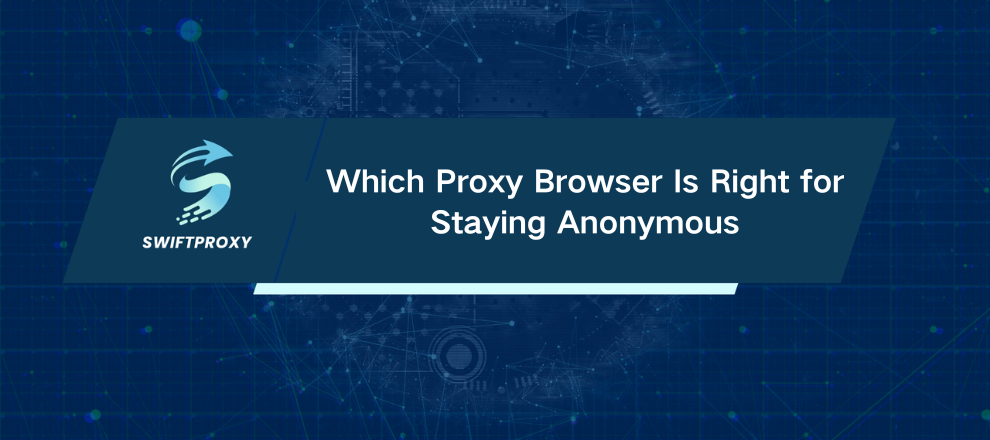Which Proxy Browser Is Right for Staying Anonymous
Proxy browsers are the secret weapon for anyone who wants control over their digital footprint, seamless access to restricted content, and smarter traffic management. Whether you’re a professional managing multiple accounts, a marketer testing campaigns, or simply someone tired of geo-blocks, the right proxy browser can make all the difference. Let’s break down the best options for desktop, mobile, and cloud, and see which fits your needs.

What Is a Proxy Browser
A proxy browser routes your internet requests through intermediary servers. The result? Anonymity, bypassed restrictions, and more control over your network behavior. Some browsers rely on extensions, others on system-level configurations, and some run everything through the cloud. Understanding these differences helps you choose the tool that actually works for you.
Different Types of Proxy Browsers
To avoid confusion, here's how proxy browsers break down:
Classic Browsers: Standard browsers with built-in support for proxies via settings or extensions.
Antidetect Solutions: Advanced tools that mask digital fingerprints and manage multiple proxies effortlessly.
Cloud Solutions: Web-based proxies that run through remote servers, no installation needed.
Mobile Apps: Proxy functionality implemented at the OS level for iOS and Android.
This classification isn't just academic—it's a roadmap for finding the browser that aligns with your goals.
Main Features to Look For
When choosing a proxy browser, don't stop at “supports proxies.” Look for:
Advanced Settings: Manual IP, port, protocol (HTTP, HTTPS, SOCKS5), authentication, and rotation rules.
Multi-Profile Support: Create isolated profiles for different tasks or accounts.
Cross-Platform Compatibility: Windows, macOS, Linux, Android, iOS.
Transparent Pricing: Free trials, fair subscription models.
Extra Features: Fingerprint creation, API integration, automation scenarios.
The devil is in the details—these extras can be the difference between frustration and seamless workflow.
Classic Proxy Browsers
Perfect for everyday tasks like bypassing blocks or checking website availability.
Mozilla Firefox: Native proxy interface, supports HTTP/S and SOCKS4/5. Dynamic IP switching, authentication, and profile-based extensions make it flexible for multiple scenarios.
Tor: Routes traffic through a secure network of nodes. Incredible for anonymity and bypassing restrictions, though speed takes a hit. Best when privacy outweighs performance.
UR Browser: Built-in tracker blockers and private modes. Combine with proxy servers, and you get simple but effective anonymity.
Google Chrome: Requires extensions for advanced proxy features like profile switching and IP rotation. Simple for basic tasks, but limited out-of-the-box.
Opera: Offers a built-in VPN for easy regional bypassing. Extension support is modest, but perfect for users prioritizing simplicity over complex configuration.
Antidetect Browsers
These are the power tools for professionals handling multiple accounts or avoiding detection:
Dolphin Anty: Team collaboration, proxy rotation, mass import. Free tier supports 10 profiles.
MoreLogin: Social media management with isolated profiles and automatic fingerprint configuration. Free tier includes 2 profiles.
GoLogin: Advanced fingerprint management with desktop and web versions. Free plan covers 3 profiles.
AdsPower: Multi-accounting, IP validation, integrates with RPA tools. Free for 2 profiles.
OctoBrowser: High-performance with precise IP distribution, no free plan.
AntikBrowser: Advanced configuration and fingerprinting, no free version.
Lalicat: Focused on automation and business users, with API integration and mass proxy import.
These tools go beyond simple IP masking—they simulate real users across multiple sessions, devices, and geolocations.
Cloud Proxy Solutions
For simplicity and low maintenance, cloud-based solutions are unbeatable. You don't install anything—the proxy runs remotely. Ideal for casual anonymity or bypassing blocks.
CroxyProxy: Simple, anonymous browsing.
4everproxy: Choose server location to spoof geolocation.
ProxySite: Multiple servers and protocols.
Hidester: Secure HTTPS connections.
KProxy: Fast, minimal latency, wide server selection.
Cloud proxies are less flexible than desktop antidetect solutions, but they require zero setup and protect your IP effectively.
Mobile Proxy Browsers
Mobile proxy browsers are often limited by OS constraints, but some stand out:
Tor for Android: Uses the anonymizing Tor network, bypasses blocks, focuses on automatic protection rather than flexible configuration.
Puffin Browser: Cloud-based; all traffic is routed through developer servers. Faster page loads, bypass restrictions, but no manual IP setup.
Browser Proxy: Dynamic IP rotation, encrypted traffic, built-in ad blocker. Minimal setup required.
Psylo (iOS): Each tab gets its own IP, making sessions appear as separate devices. Built-in tracking protection. One of the best proxy solutions for iPhone.
Conclusion
The right proxy browser gives you control over your online experience. Whether you are managing multiple accounts, testing campaigns, or bypassing restrictions, the right tool can streamline your workflow, protect your privacy, and keep your online presence flexible.

















































